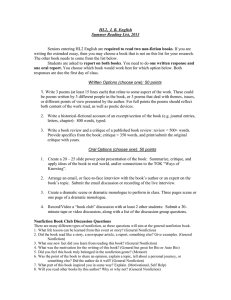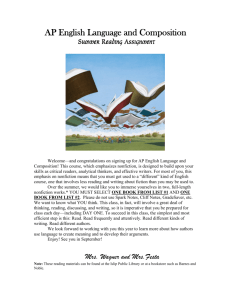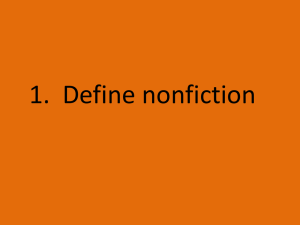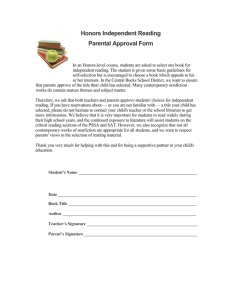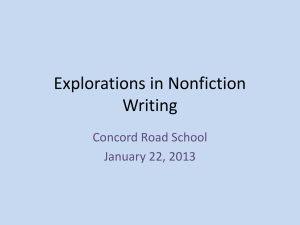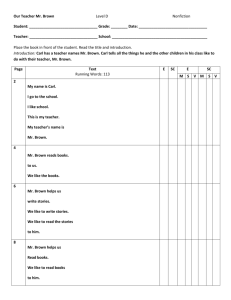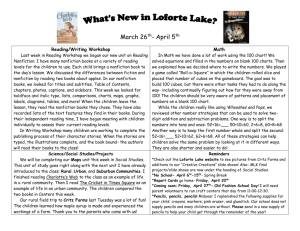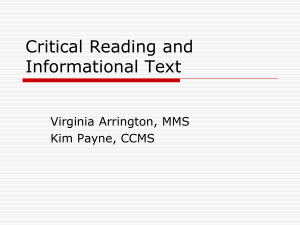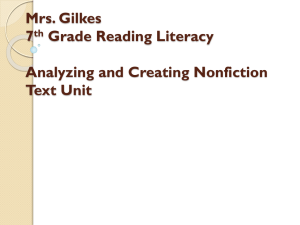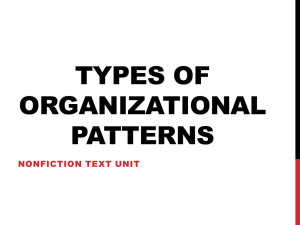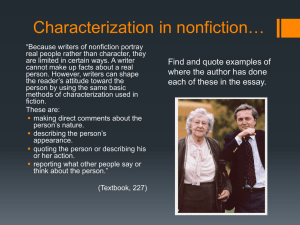Summer Reading 2015 - Southwest High School
advertisement
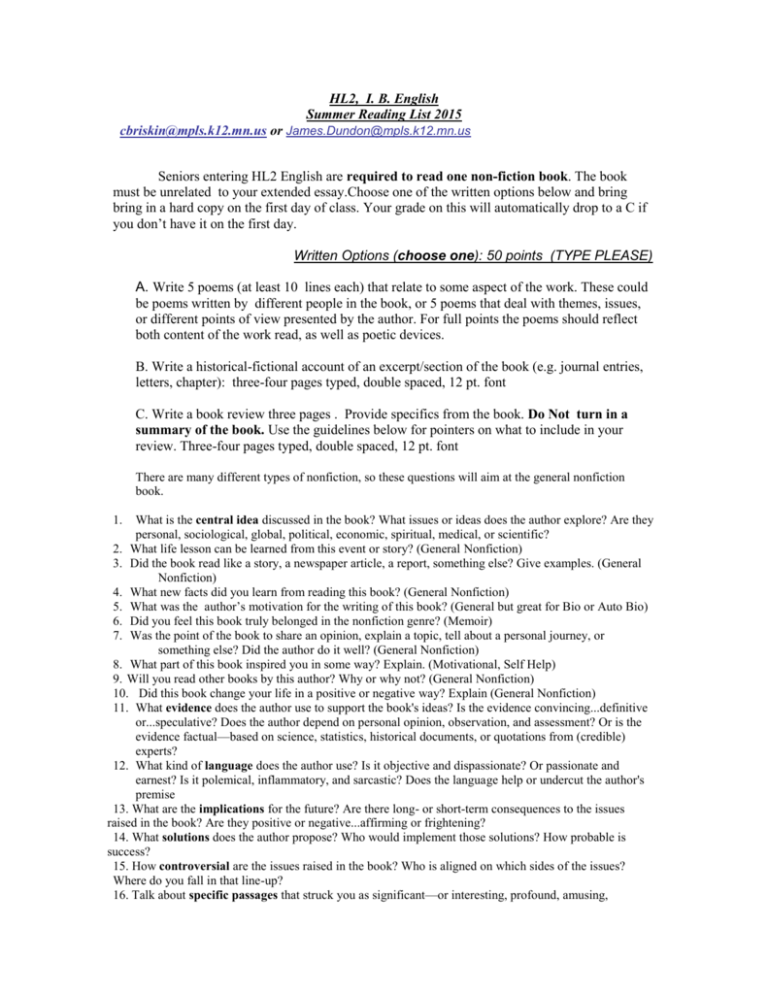
HL2, I. B. English Summer Reading List 2015 cbriskin@mpls.k12.mn.us or James.Dundon@mpls.k12.mn.us Seniors entering HL2 English are required to read one non-fiction book. The book must be unrelated to your extended essay.Choose one of the written options below and bring bring in a hard copy on the first day of class. Your grade on this will automatically drop to a C if you don’t have it on the first day. Written Options (choose one): 50 points (TYPE PLEASE) A. Write 5 poems (at least 10 lines each) that relate to some aspect of the work. These could be poems written by different people in the book, or 5 poems that deal with themes, issues, or different points of view presented by the author. For full points the poems should reflect both content of the work read, as well as poetic devices. B. Write a historical-fictional account of an excerpt/section of the book (e.g. journal entries, letters, chapter): three-four pages typed, double spaced, 12 pt. font C. Write a book review three pages . Provide specifics from the book. Do Not turn in a summary of the book. Use the guidelines below for pointers on what to include in your review. Three-four pages typed, double spaced, 12 pt. font There are many different types of nonfiction, so these questions will aim at the general nonfiction book. 1. What is the central idea discussed in the book? What issues or ideas does the author explore? Are they personal, sociological, global, political, economic, spiritual, medical, or scientific? 2. What life lesson can be learned from this event or story? (General Nonfiction) 3. Did the book read like a story, a newspaper article, a report, something else? Give examples. (General Nonfiction) 4. What new facts did you learn from reading this book? (General Nonfiction) 5. What was the author’s motivation for the writing of this book? (General but great for Bio or Auto Bio) 6. Did you feel this book truly belonged in the nonfiction genre? (Memoir) 7. Was the point of the book to share an opinion, explain a topic, tell about a personal journey, or something else? Did the author do it well? (General Nonfiction) 8. What part of this book inspired you in some way? Explain. (Motivational, Self Help) 9. Will you read other books by this author? Why or why not? (General Nonfiction) 10. Did this book change your life in a positive or negative way? Explain (General Nonfiction) 11. What evidence does the author use to support the book's ideas? Is the evidence convincing...definitive or...speculative? Does the author depend on personal opinion, observation, and assessment? Or is the evidence factual—based on science, statistics, historical documents, or quotations from (credible) experts? 12. What kind of language does the author use? Is it objective and dispassionate? Or passionate and earnest? Is it polemical, inflammatory, and sarcastic? Does the language help or undercut the author's premise 13. What are the implications for the future? Are there long- or short-term consequences to the issues raised in the book? Are they positive or negative...affirming or frightening? 14. What solutions does the author propose? Who would implement those solutions? How probable is success? 15. How controversial are the issues raised in the book? Who is aligned on which sides of the issues? Where do you fall in that line-up? 16. Talk about specific passages that struck you as significant—or interesting, profound, amusing, illuminating, disturbing, sad...? What was memorable? 17. What have you learned after reading this book? Has it broadened your perspective about a difficult issue—personal or societal? Has it introduced you to a culture in another country...or an ethnic or regional culture in your own country? 18. If your book offers a cultural portrait of life in another country or region of your own country… 19. What observations are made in the book? Does the author examine economics and politics, family traditions, the arts, religious beliefs, language or food? 20. Does the author criticize or admire the culture? Does he/she wish to preserve or change the way of life? Either way, what would be risked or gained? 21. What is different from your own culture? What do you find most surprising, intriguing or difficult to understand? 22. Do the issues affect your life? How so—directly, on a daily basis, or more generally? Now or sometime in the future? (Questions by LitLovers. Please feel free to use them, online or off, with attribution. Thanks.) This list of non-fiction titles, accumulated and culled over thirteen years, comes mainly from many teachers at Southwest High School. Occasionally proposals from students, parents, or outsiders make their way onto the list too. We always entertain suggestions for good books. Abbey, Edward. Desert Solitaire, A Season in the Wilderness. Adams, Fred. The Five Ages of the Universe: Inside the Physics of Eternity. Deception and Its Consequences Anderson, Jon Lee. Che Guevara: A Revolutionary Life Amen, Daniel G. Unleash the Power of the Female Brain Baldwin, James. Notes of a Native Son Berman, Morris. The Twilight of American Culture Bloom, Stephen G. Postville: A Clash of Cultures in Heartland America. Boo, Katherine. Beyond the Beautiful Forevers Brafman, Ori and Rom. Sway: The Irresistible Pull of Irrational Behavior Bryson, Bill. The Mother Tongue. (An entertaining history of English) Bryson, Bill. A Short History of Nearly Everything Burns, Sarah. The Central Park Five Cahill, Thomas. Sailing the Wine-Dark Sea: Why the Greeks Matter. Cahill, Thomas. How the Irish Saved Civilization: The Untold Story of Ireland’s Heroic Role from the Fall of Rome to the Rise of Medieval Europe. Cain, Susan. Quiet: The Power of the Introverts in a World that Can’t Stop Talking Campbell, Joseph and Bill Moyers. The Power of Myth. It’s a famous book. (293 pgs) Carson, Rachel. The Silent Spring. (The book that launched the ecological movement in the U.S.) Coyne, Jerry A. Why Evolution Is True Cullen, Dave. Columbine. (A study of the 1999 high school shooting) Dawkins, Richard. The Selfish Gene. (A famous, enlightening study of genetics) Didion, Joan. The White Album Dillard, Annie. A Pilgrim at Tinker Creek (Reflections of a Pulitzer Prize winning naturalist) Diamond, Jared. Guns, Germs, and Steel: The Fates of Human Societies. Du Bois, W.E.B., The Souls of Black Folks. Dungy, Tony. Quiet Strength (Life lessons from a great NFL coach) Dylan, Bob. Chronicles Vol. I Edmonds, David and John Eidinow. Bobby Fischer Goes to War: How a Lone American Star Defeated the Soviet Chess Machine Ehrenreich, Barbara. Nickel and Dimed: On (Not) Getting By in America. Feiler, Bruce. Walking the Bible: A Journey by Land Through the Five Books of Moses Foer, Joshua. Moonwalking with Einstein: The Art and Science of Remembering Everything Foote. The Civil War: A Narrative. (These three volumes will count as three books for the summer reading assignment.) Foer, Franklin. How Soccer Explains the World. Foster, Thomas C. How to Read Like a Professor Frankl, Victor. Man’s Search for Meaning (Life lessons from a Holocaust survivor) Franzen, Jonathan. How to Be Alone: Essays. Freud, Sigmund. On Dreams. Friedman, Thomas. From Beirut to Jerusalem. Friedman, Thomas. The World Is Flat Galbraith, John. The Affluent Society Gladwell, Malcolm. Blink, The Power of Thinking Without Gladwell, Malcolm. Outliers Gleick, James. Chaos: Making a New Science Gombrich, Ernest H. Art and Illusion. Goodwin Kearns, Doris. Team of Rivals Gourevitch, Philip. We Wish to Inform You That Tomorrow We Will be Killed with Our Families: Stories from Rwanda. Guttenplan, D.D. The Holocaust on Trial Grandin, Temple. Animals in Translation: Using the Mysteries of Autism to Decode Animal Behavior Halberstad, David, and John McCain. The Best and the Brightest. (How America became involved in Vietnam) Harden, Blaine. Escape from Camp 14 Hecht, Jennifer. Doubt: A History: The Great Doubters and Their Legacy of Innovation . . . Herrara, Hayden. Frida (A biography of Frida Kahlo) Hillenbrand, Lauren. Unbroken James, William. The Varieties of Religious Experience Kessler, David. The End of Overeating: Taking Control of the Insatiable American Appetite Kindlon, Daniel, et. al. Raising Cain: Protecting the Emotional Life of Boys. King, Martin Luther. Why We Can’t Wait Kiernan, Denise. The Girls of Atomic City Klein, Naomi. Shock Doctrine: The Rise of Disaster Capitalism Kolbert, Elizabeth. Field Notes from a Catastrophe: Man, Nature and Climate Change Kozol, Jonathan. Savage Inequalities. (On inequalities in educational opportunities in the U.S.) Krakauer,Jon. Into The Wild Kristoff, Nicholas and WuDunn, Sheryl. Half the Sky: Turning Oppression into Opportunity for Women Worldwide Larson, Erik. In the Garden of the Beast Larson, Erik. The Devil in the White City: Murder, Magic, and Madness at the Fair that Changed America. Levin, Janna. How the Universe Got Its Spots: Diary of a Finite Time in a Finite Space. Lightman, Allen. A sense of the Mysterious: Science and the Human Spirit Malcolm X. The Autobiography of Malcolm X Mayer-Schonberger, Viktor and Cukier, Kenneth. Big Data McCall, Nathan. Makes Me Wanna Holler: A Young Black Man in America. McDougall, Christopher. Born to Run: A Hidden Tribe, Superathletes and the Greatest Race the World Has Never Seen. Mendelson, David. The Lost: A search for Six of Six Million Pausch, Randy. The Last Lecture Peterson, Ivars. The Mathematical Tourist: New and Updated Snapshots of Modern Mathematics. Pipher, Mary. Reviving Ophelia. (Female adolescence in America) Pollan, Michael. In Defense of Food. (Changing America’s food culture) Power, Samantha. A Problem from Hell: America and the Age of Genocide. Power, Samantha. Chasing the Flame: One Man’s Fight to Save the World. Rhodes, Richard. The Making of the Atomic Bomb. Robison, John Elder. Look Me in the Eye: My Life with Asperger’s. Roberts, Jason. A Sense of the World: How a Blind Man Became History’s Greatest Traveler. Rome, Adam. The Bulldozer in the Countryside: Suburban Sprawl and the Rise of American Environmentalism Rubin, Gretchen. The Happiness Project Ruppert, Michael. Crossing the Rubicon The Decline of the American Empire at the End of the Age of Oil. Russell, K., M. Wilson, and R. Hall. The Color Complex. (The effects of color differences within the African American community) Said, Edward. On Late Style: Music and Literature Against the Grain. Shermer, Michael. Why People Believe Weird Things. Shermer, Michael. The Science of Good and Evil: Why People Cheat, Gossip, Care, Share, and Follow the Golden Rule. Skloot, Rebecca. The Immortal Life of Henrietta Lacks Steeves, Rick. Travel as a Political Act Stone, Merlin. When God Was a Woman (Surprising historical insights into Western society, religion, and gender roles) Symanski and Suter. Soccernomics (World professional soccer from mathematical, statistical, and economic perspectives) Suzuki, Daisetz. Zen and Japanese Culture. Takakai, Ronald. Strangers from a Different Shore: A History of Asian Americans. Terkel, Studs. Working: People Talk About What They Do All Day and How They Feel About What They Do Thomas, Lewis. The Lives of a Cell. (Essays on science) Tolle, Echart. The Power of Now (A book about moving beyond the analytical mind) Trilling, Lionel. The Liberal Imagination and Rand, Ayn. The Virtue of Selfishness. (Paired books. These two books count as one.) Tuchman, Barbara. The Guns of August: Practicing History (Events leading to World War I) Veblen, Thorstein, The Theory of the Leisure Class (A Minnesota native’s landmark 1899 study exposing American affluence) Walls, Jeannette. The Glass Castle Weatherford, Jack Indian Givers (contributions of Native American cultures to "Western Civilization") Woodward, Carl and Carl Bernstein. All the President's Men Woolf, Virginia. A Room of One's Own. (An introduction to twentieth century feminism) Stone, Rosamund and Benjamin Zander.. The Art of Possibility: Transforming Professional and Personal Life Zimbardo, Philip. The Lucifer Effect, Understanding How Good People Turn Evil.
